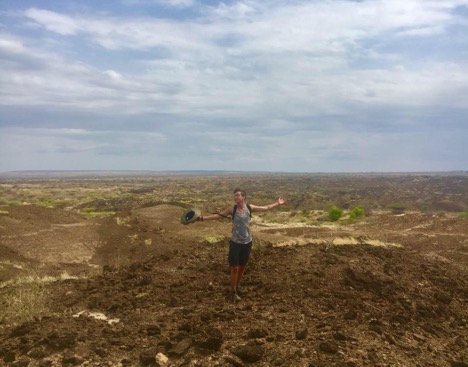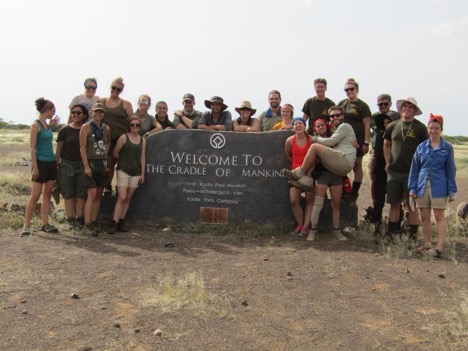Name: James Frazier
Class Year: 2019
Major: Anthropology
Hometown: Albuquerque, N.M.
Placement: Koobi Fora Field School
Location: East Turkana Basin, Kenya
I first learned of the Koobi Fora Field School through my anthropology professor, Maja Šešelj. Field school is … a strange thing. Broadly speaking, it is both study abroad and summer research, while still managing to be neither of those things exactly. I spent six weeks in Northern Kenya conducting a paleoecological research project. With the help of my mentor, Amanda McGrosky, I investigated how life history traits (such as reproductive strategies, life span, etc.) influenced changes in the abundance of species population during the early Paleolithic (approx. 2.6-1.8 million years ago). We will hopefully be presenting our findings at conferences this fall and next year. Since I know that paleoecology isn’t everyone’s cup of tea, in fact I knew nothing about it until field school, I’ll describe field school like this:
Imagine: 25 exhausted, jet lagged and eager students, enough scientists to start a small conference, and a support staff of the world’s most incredible mechanics and cooks that can work miracles with canned beans and rice. Now load them up into range rovers and a 16 seater, open air, ex-military Unimog and drive them up the length of Kenya. Then send a few of them out into over 100-degree heat to walk around and collect fossils for days on end. Six weeks, 43 dik-diks, eight scorpions, 232 fossil collections, one research paper and a plan for the future later, send them all home covered in dirt. You better believe I am absolutely ready to do it again next year.
Students from Bryn Mawr have gone to the Koobi Fora Field School in the past so I was reassured about its academic rigor and I knew what an amazing experience it could be if I decided to attend; however, I also knew that my experience would inherently be different than theirs. I am a transgender man and the concerns I had about a summer spent with a small research team in an isolated region of Kenya aren’t ones shared by the average student. The research I conducted into the academics of the field schools I considered was only a small fraction of the work I did to make sure the program would be a place where I could be physically safe as well as supported. While trying to gather as much information as possible, I stumbled on an entire community of queer and trans* researchers and scientist willing to support and advise me, or put me in contact with others that might know more. Before I committed to the Koobi Fora Field School, I spoke with so many individuals who wanted nothing more than to see me succeed. Even if I had decided against going to field school, finding that community made all the work I had done worth it. I eagerly await the day I able to be a voice in that community and a support for others.
While I spent hours and days (and what sometimes felt like years) preparing for this field school, I had very little idea of what I would actually be doing when I got there. I knew the general idea of course: it’s a paleoanthropological field school in the East Turkana Basin in Northern Kenya and I’d be working on a research project with a mentor. As to how those vague ideas translated into reality, I had no clue. But I knew that with the preparation I had done, I’d be able to succeed no matter what situation I walked into. Though it wasn’t always easy, it was absolutely amazing.
One of the biggest surprises was that, while my primary interest is in biological anthropology and I plan to focus on human remains and fossil hominins, for field school I was assigned to a paleoecology project. Paleoecology is not a field I have ever explored, and at first I was concerned that my background would mean I wouldn’t be able to complete the project. Plus, since I plan on studying humans I was worried that a summer spent studying paleoecology might not be the most useful to me. That, however, was an oversimplification of the project. Yes, it was the summer of paleoecology, but it was also a time where I learned how to code, analyze data and present it to others in meaningful way. I got experience working in the field, building relationships and making connections with other researches. And it turns out, once I let myself be open to it, I actually love paleoecology and I may even be rethinking my career path.
The experiences I gained during field school, the relationships I’ve made and the conversations I’ve had, have already influenced not only my academic studies for the upcoming year, but how I am approaching my future. Each researcher focused on a different field of anthropology and geology and each person was deeply passionate about their work. The summer has taught me that I don’t need to settle, that there is still so much to learn, and so many areas to explore. I am working to find a career that will let me keep and use that passion every single day.


